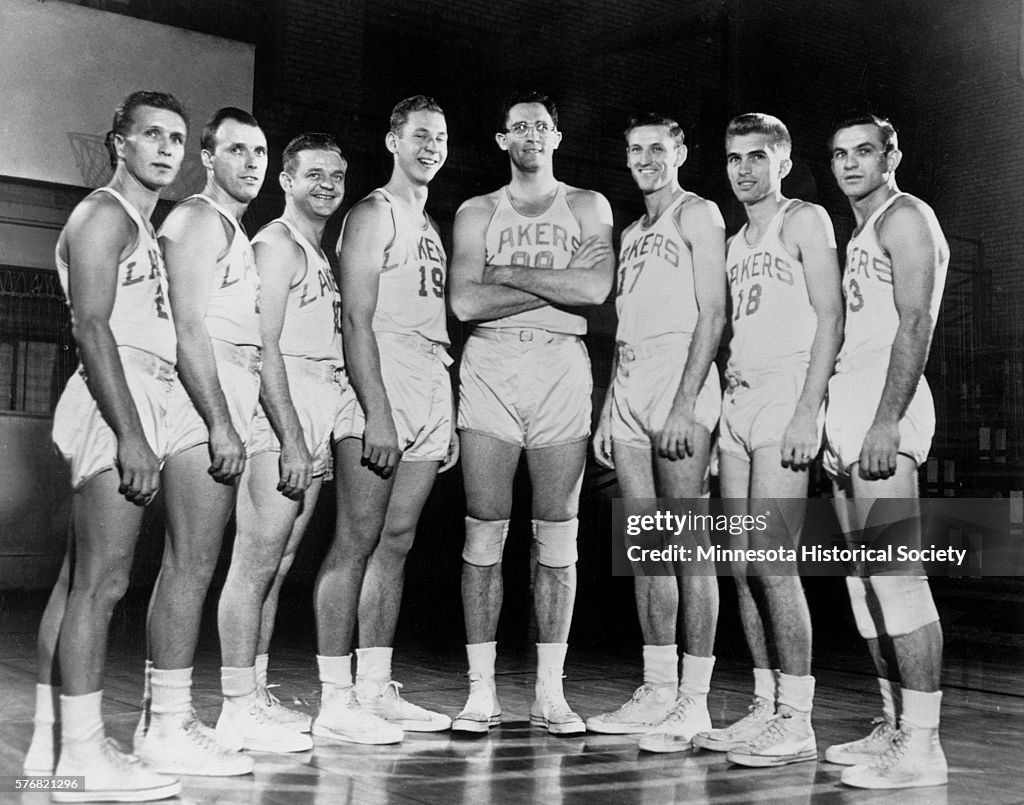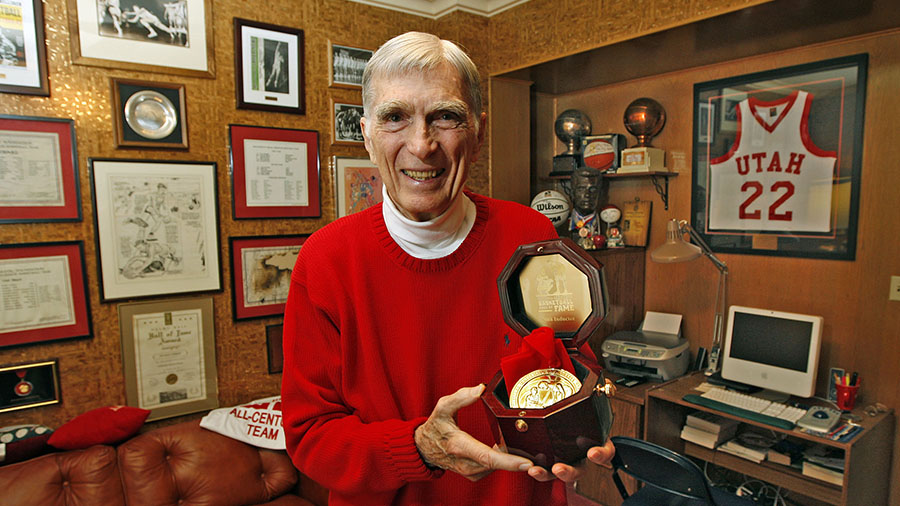Arnie Ferrin was a legend. And you've probably never heard of him.
Chariton Arnold Ferrin Jr. was born on July 29, 1925 in Salt Lake City, Utah, and grew up in Ogden, Utah. In 1944, he led the University of Utah to the Championship of the NCAA Tournament, beating Dartmouth in the Final. He became the 1st freshman to win the Tournament's Most Outstanding Player award. He and teammate Fred Sheffield had the Utes on a path to repeating in 1945, but World War II was still raging, and both were drafted, and unavailable for the Tournament.
Although Ferrin returned to help Utah win the National Invitational Tournament in 1947 -- until the 1951 point-shaving scandal, still considered bigger than the NCAA -- Utah didn't reach the NCAA Final Four again until 1961. Ferrin became Utah's 1st, and is still its only, 4-time All-American. They have retired his Number 22.
He was selected by the Minneapolis Lakers in the 3rd Round of the 1948 NBA Draft. The Lakers had just joined the NBA from the National Basketball League, where, led by George Mikan, they had won the previous season's Championship. Ferrin became part of a dynasty that included 6 men who would be elected to the Basketball Hall of Fame: Himself, Mikan, Jim Pollard, Vern Mikkelsen, Slater Martin and head coach John Kundla. (Clyde Lovellette would not reach the Lakers until Ferrin left, but would also win a Championship with them, and be elected to the Hall.)
The Lakers won the NBA Championship in 1949 and 1950, and reached the Western Conference Finals in 1951, leading to 2 titles for Ferrin. After he left, they won the title again in 1952, 1953 and 1954.
The 1950 NBA Champion Minneapolis Lakers. Left to right:
Slater Martin, Don Carlson, Herman Schaefer, Vern Mikkelsen,
George Mikan, Jim Pollard, Arnie Ferrin (Number 18), and Tony Jaros.
Ferrin returned to the University of Utah, as a broadcaster for their basketball and football teams. From 1972 to 1974, he was the general manager of the Utah Stars of the American Basketball Association. The Stars had won the ABA Championship in 1971, and reached the Finals again under his leadership in 1974.
He went back to the University of Utah in 1976, and served as athletic director until 1985. The school was 10 National Championships across various sports, including 4 in gymnastics under head coach Greg Marsden. The basketball team was then coached by Jerry Pimm, winning 3 Western Athletic Conference titles.
He was elected to the Basketball Hall of Fame, the National Collegiate Basketball Hall of Fame, the Utah Sports Hall of Fame, and, with the University of Utah's move to the Pacific-12 Conference, the Pac-12 Hall of Honor.
He and his wife, RoLayne Rassmussen, had four children: Chariton Arnold Ferrin III, a.k.a. Tres Ferrin, Richard, Louanne and Shawn. He had 8 grandchildren, 2 of whom were also sons named Chariton, although neither was a Chariton Arnold Ferrin IV. He lived to see 12 great-grandchildren and 4 great-great-grandchildren. After RoLayne's death, he married again, to Patricia Panos, who survived him. He was a speedboat enthusiast, and was twice a semifinalist in the Utah State Amateur Golf Championship.
Arnie Ferrin died on December 27, 2022, of natural causes. He was 97 years old. He was the last surviving member of Utah's 1944 National Champions, and the last surviving member of the 1949 NBA Champion Minneapolis Lakers. With his death, there are 2 surviving members of the 1950 NBA Champion Lakers, the earliest surviving NBA Champions: Bob Harrison and Bud Grant. Yes, the same Bud Grant who would later coach the Minnesota Vikings to 4 NFC Championships.
Ferrin had also played in the 1950 game in which the Fort Wayne Pistons held the ball so much, to keep it away from Mikan, that it became the lowest-scoring game in NBA history: Pistons 19, Lakers 18. This inspired the institution of the 24-second shot clock. Harrison and Grant are also the last 2 surviving players from that game.
And Bob Cousy, with the College of the Holy Cross in 1947, is now the earliest surviving member of a team that won the NCAA Tournament.
UPDATE: Ferrin's final resting place is not publicly known.



No comments:
Post a Comment